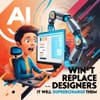At the 9th edition of the DesignUp Conference in Bengaluru, leading design professionals underscored a reassuring message: artificial intelligence (AI) isn’t poised to replace designers, but rather to elevate their work. According to Alex Skougarevskaya (Head of Design at Canva), AI will enable designers to explore far more ideas in the same time-span—“instead of doing two or three concepts, you can explore 50”—while designers remain in control of final decisions and creative direction.
The speakers emphasised that essential human qualities—judgment, taste, empathy, defining problems—will remain firmly in the designer’s realm. Archana Thiagarajan of Adobe noted that while tools multiply, what matters is how designers contextualise problems, pick their “superpower,” and deliver impact. And Fonz Morris (former Netflix lead product designer) pointed out that designers should widen their skill-set—writing, coding, business strategy—because the value of design is becoming more strategic than just aesthetic.
From a skills-perspective, the consensus was clear: mastering foundational design principles remains more important than only learning new AI tools. Designers were encouraged to focus on user-needs, problem definition, rapid prototyping and iteration—these core competencies will anchor them even as AI expands their toolkit.


